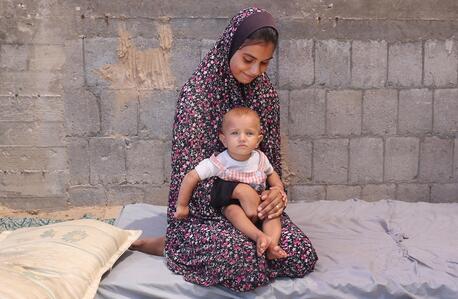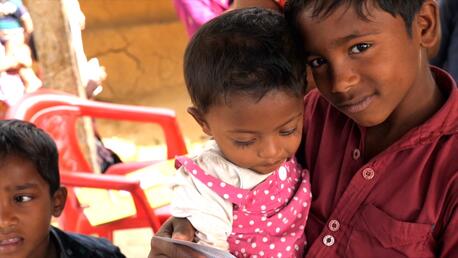
Time Spent Fetching Water Keeps Girls Out of School in Nigeria
The days begin early for 13-year-old Uzzaya Idris, who lives with her family in Gabarin, a village in northeast Nigeria's Bauchi state. She's up by 6 a.m. every morning to fetch the water her family will use for drinking, cooking, bathing and washing clothes.
The time-consuming trek to the nearest uncontaminated water source falls to the girls and women of the village. "I fetch water once a day in the morning, but I have to walk a really long way to get it," Uzzaya says.
There's open water closer to the village, but it's not safe to drink. Cholera, a waterborne disease, is endemic in Nigeria; the country is experiencing its worst cholera outbreak in a decade. By mid-December 2021, a total of 107,911 suspected cases had been reported by the Nigeria Center for Disease Control, including 3,598 deaths — more than the 3,027 COVID-19 deaths confirmed since the start of the pandemic.
Time spent collecting water is time away from the classroom, denying girls a chance to build a better future
"Fetching water has really affected my studies," Uzzaya says. "Most of the time, by the time I get back, lessons have already started. And sometimes, by the time I get to school, it's already break time."
"If I didn't have to fetch water every morning, I would be on time to school. I would have time to visit my relatives and even some time for myself."
A total of 2.8 million people across Nigeria are in critical need of sustained, equitable access to clean water and dignified hygiene and sanitation services. UNICEF is working with partners to build capacity and strengthen state-level water, sanitation and hygiene services. In 2022, UNICEF plans to reach 1.6 million people in Nigeria with safe water for drinking and domestic needs.
In 2022, UNICEF and partners will reach more than 1.2 million children in Nigeria with formal and nonformal education, including early learning.
Support UNICEF's work to remove the barriers to girls' education so every girl can reach her full potential. Please donate.
The bipartisan Keeping Girls in School Act is designed to harness the power of U.S. Government to address the barriers that prevent girls from getting an education. Urge your Members of Congress to support legislation that empowers girls around the world.
Top photo: For 13-year-old Uzzayah Idris in Bauchi state, Nigeria, time spent fetching water for her family means less time in the classroom. UNICEF is working to ease the water burden that prevents girls from getting a quality education. Video edited by Tong Su for UNICEF USA.
Time spent collecting water is time away from the classroom, denying girls a chance to build a better future. [VIDEO]
HOW TO HELP
There are many ways to make a difference
War, famine, poverty, natural disasters — threats to the world's children keep coming. But UNICEF won't stop working to keep children healthy and safe.
UNICEF works in over 190 countries and territories — more places than any other children's organization. UNICEF has the world's largest humanitarian warehouse and, when disaster strikes, can get supplies almost anywhere within 72 hours. Constantly innovating, always advocating for a better world for children, UNICEF works to ensure that every child can grow up healthy, educated, protected and respected.
Would you like to help give all children the opportunity to reach their full potential? There are many ways to get involved.





